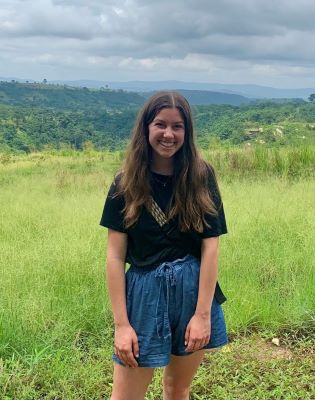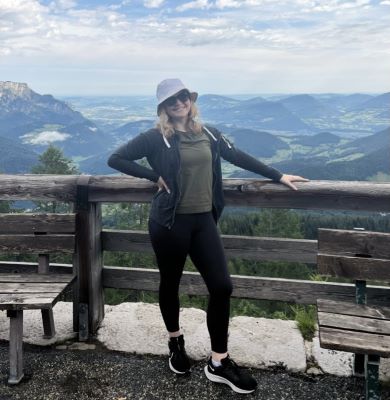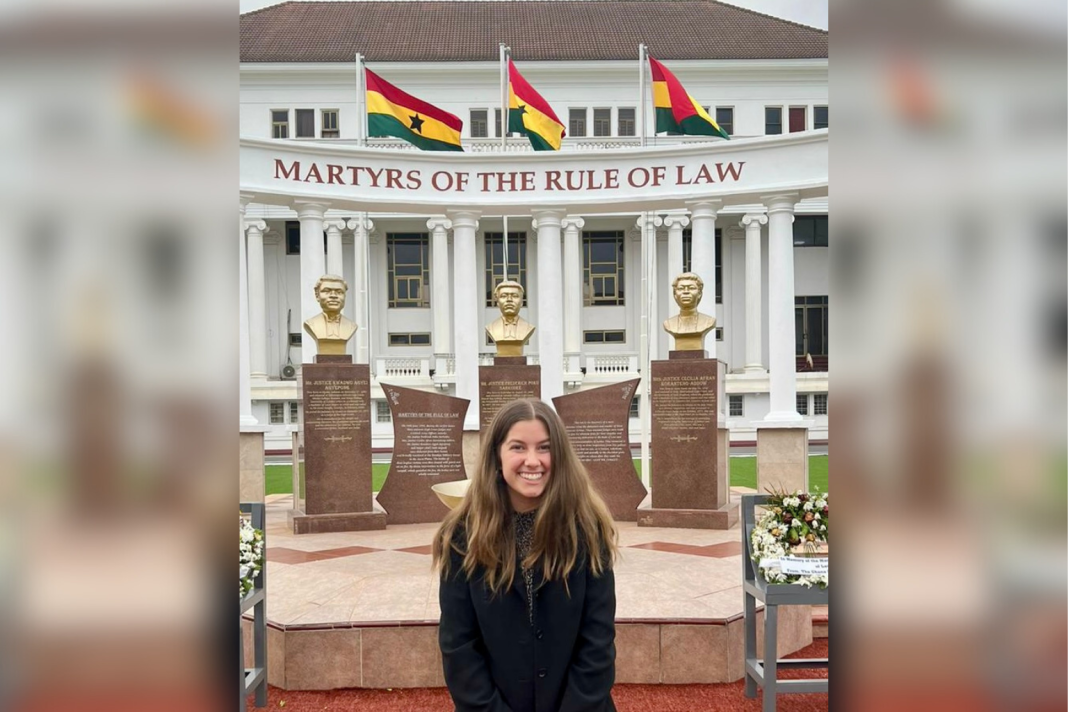The first time Emma Joy McArthy spoke to a legal client, she was in a Ugandan prison. He was her age, arrested for murder. She was halfway around the world from home as a Pepperdine Caruso School of Law student.
“As I began talking with him, I was struck by the realization that from opposite sides of the globe, we likely hit milestones at similar times, had shared childhood experiences, and now found ourselves on different sides of the attorney-client table,” McArthy said.
That conversation reshaped her understanding of law and justice. It was a moment of empathy that exposed the complexities of legal systems and the humanity behind each case.
“I began to understand how justice and mercy intersect as I interacted with this man and so many others,” she said.
For McArthy, and other law students who’ve studied abroad, those moments offer far more than academic enrichment. They offer clarity, purpose and a career-defining edge. These stories serve as a guide for future students who wonder whether time abroad can truly shape their professional future.
Legal lessons in West Africa
McArthy’s journey began with Pepperdine’s Sudreau Global Justice Institute, where she interned for two high-ranking justices in Ghana: one on the Court of Appeal and one on the Supreme Court. Her time abroad also included a week in Uganda, where she took part in a plea bargaining initiative with American and Ugandan lawyers, judges and law students.
She gained hands-on legal research and writing experience in Ghana, while Uganda gave her the opportunity to negotiate real plea deals. Just as important, she witnessed firsthand how other countries operate within their legal systems, which increased her understanding of the strengths and weaknesses of the United States’ legal system.
But the summer was not all work. McArthy and her fellow interns made sure to make room for exploring their new surroundings.
“Most weeks in Ghana involved several days of court observation,” McArty said. “This was very interesting because I saw a couple different trials progress throughout the course of the summer and completed several research assignments related to those cases. Outside of court, my co-interns and I spent a lot of time exploring Ghana. We enjoyed visiting local markets, restaurants, and beaches, and we took several weekend trips. Immersing myself in the culture was just as impactful as the legal experience.”

She first learned about the program while applying to law schools and said it was one of the reasons she chose Pepperdine Caruso Law, with an anticipated graduation date of May 2026.
“I am very interested in international human rights work, and I don’t know of any other law school that has such a unique program in this area of law,” McArthy said.
According to Seth Bamberg, associate director of the Sudreau Global Justice Institute, that kind of experience is by design.
“My sense is that many employers are looking for graduates with practical experiences that are either prestigious or interesting,” Bamberg said. “[Our program] has the immense privilege of facilitating experiences that are both — namely, Supreme Court clerkships in multiple African nations.”
In addition to the court work, Bamberg said students gain valuable skills through client representation and collaboration with local legal professionals.
“Our students also work alongside local lawyers and law students to help resolve cases of people in prison being held in pretrial detention, gaining amazing hands-on experience in client representation and cross-cultural collaboration,” he said. “Our students always return with experiences that have deeply impacted them both personally and professionally. The most common phrase we hear from our students about their experience is ‘life changing.'”
Studying abroad also gave McArthy something else: confidence.
“I never would have expected to be able to negotiate a plea deal as a law student in a Ugandan maximum-security prison, but suddenly I found myself doing it,” she said.
Stepping out of her comfort zone changed her mindset.
“Once you take a step or two outside of your comfort zone, momentum builds,” she said. “Doing things that stretch you gets easier and easier.”
Her experience has become a standout feature in every interview she’s had since.
“People are usually intrigued and impressed because it is such a unique experience to have as a law student,” McArthy said. “This tends to be the first thing on my résumé interviewers notice and ask about.”
More importantly, it affirmed her commitment to international human rights law.
“In some ways, I viewed the nine weeks as a trial run to determine if I would actually be interested in living and working internationally after graduation,” she said. “By the end of the internship, I was even more excited about that possibility than when I arrived.”
A historical lens on justice
Elsa Abrahamson earned her J.D. in May 2025 from Creighton University School of Law. She took a different path to global legal education. Her study abroad program immersed her in international criminal law and the history of the Holocaust, with stops in The Hague, Nuremberg and Kraków.

She visited the Kosovo Special Chambers, the International Criminal Court and the Mechanism for International Criminal Tribunals, before continuing to Germany and Poland for site visits and classes such as Impact on the Law of the Holocaust and its Legacy and International Criminal Law.
In Nuremberg, she took courses while also exploring sites such as Courtroom 600 and the Palace of Justice. Her time in Kraków included powerful visits to Auschwitz I and II-Birkenau, the Galicia Jewish Museum, the Plaszów Memorial Site, the Ghetto Heroes Square Memorial and the Schindler Factory.
For her, the program made history come alive.
“It became more ‘real’ when you see the countless possessions that people were forced to abandon, the records, photos and videos the Nazis took and were recovered, and the buildings and structures that remained,” Abrahamson said.
More than just historical reflection, the experience shaped her legal outlook. She said it deepened her understanding of the role that accountability, responsibility and integrity play in the legal profession. The knowledge she gained influenced not only her academic trajectory but her sense of duty as a future attorney.
“Having had this experience, I will be especially cognizant of the ethical and legal failures that allowed the Holocaust to occur,” she said. “It helped me recognize and hopefully prevent future injustice, prejudice and state-sponsored discrimination in our legal system.”
After the program, Abrahamson returned to Creighton more committed than ever to international law. She worked as a research assistant to Professor Michael Kelly on global legal projects, took additional international law courses and served as editor-in-chief of the Creighton International and Comparative Law Journal.
Although she didn’t have a traditional first-year internship, Abrahamson said the study abroad experience more than made up for it. The trip was often a talking point in interviews, helping her define the kind of advocate and professional she aspired to be.
“I have found that the experience stands out because of how truly unique and impactful my experience was on the kind of person, advocate and lawyer I want to be known as,” Abrahamson said.
“The program helped mold and develop my soft skills, such as empathy for others and listening to their stories,” she said. “On an academic level, it helped me develop knowledge and language skills to grow as an advocate for others.”
Advice for the next generation
To students considering a study abroad program, both McArthy and Abrahamson emphasized its transformative power.
“Don’t limit yourself to the conventional law school path; there’s a really incredible world out there that can teach you things you won’t learn sitting in a torts class,” McArthy said.
Abrahamson said, “It is one thing to read about history or a place where something took place, but physically being there and witnessing it is a unique experience that will stay with you long after the program is finished.”
For law students looking to gain practical experience and differentiate themselves in a competitive field, study abroad programs offer more than cultural immersion — they provide tangible skills and insights that translate directly to legal careers.
(This article appears in the 2025 Fall issue of The National Jurist.)

